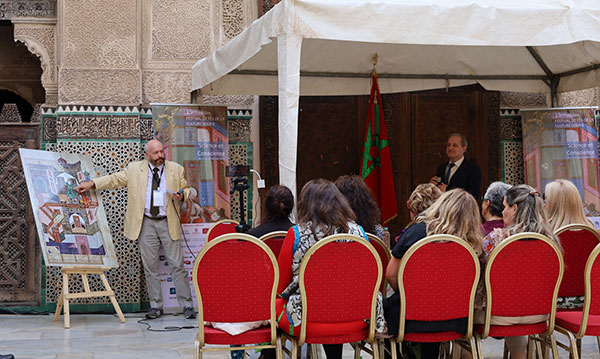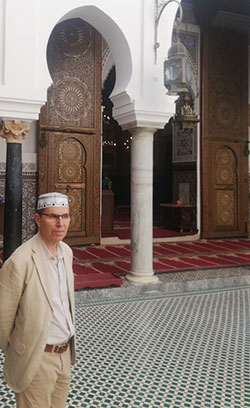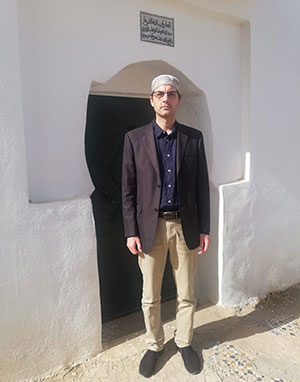Written by Abd-al-Wadoud Gouraud and Abd-al-Haqq Guiderdoni | Monday, November 21, 2022 at 12:30 p.m.
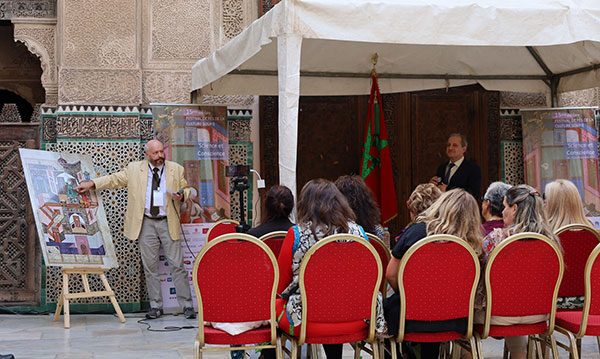
© Fez Festival of Sufi Culture
We both had the honor of being invited, as representatives of the Institute of Advanced Islamic Studies (IHEI), to the Fez Festival of Sufi Culture, which took place from October 22 to 29 on the land of the Kingdom of Morocco.
This event, organized each year by the association of the Festival of Fez of Sufi culture chaired since its creation by Faouzi Skali, proposed, for its 15th edition, a rich and varied program, under the artistic direction of Carole Latifa Ameer, and with the support, in particular, of the Ministry of Youth, Culture and Communication, and the Ministry of Habous and Islamic Affairs. The Festival associated, around the theme “Science and Consciousness”concerts of world sacred music, traditional dances, religious songs, art exhibitions, workshops, round tables and master classes, with more than 60 speakers from 15 countries.
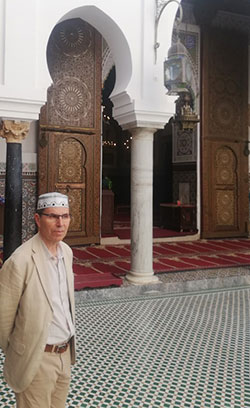
Abd-al-Haqq Guiderdoni in front of the entrance to the mosque containing the mausoleum of Moulay Idris II, son of Moulay Idris 1st, descendant of the Prophet Muhammad, founder of Fez and the Idrisid emirate.
A harmony and a sense of the sacred that permeate places as well as times
By visiting the old town of Fez, we measure how much this relationship between ” science “ and ” awareness “which in some respects might seem like a recent issue, has taken on a very particular form over the centuries, in this city marked by a long tradition of knowledge, culture and spirituality, whether through the work of craftsmen, the methods and symbols of sacred art, Islamic calligraphy, the architecture of mosques, or through traditional teaching, still present in Koranic schools and at the Al-Qarawiyyin mosque-university, the oldest university in the world, still in activity.
Harmony, beauty, peace, a sense of the sacred and the testimony of the Unit which permeate places as well as times, punctuated by the reminder of God and the call to ritual prayer, five times a day, give daily life and human existence a spiritual orientation and a metaphysical dimension. which seem far removed from the concerns of a large part of our contemporaries.
“Science without conscience is but ruin of the soul”, he was reminded during the Festival, to denounce the mistakes of technosciences, the damage of the material headlong rush, and the illusions of transhumanism, and to insist on the need for a true global ethics. It seems interesting to us to quote the complete passage of Pantagruel by Rabelais from which this sentence is taken: “But because, according to the words of the Wise Solomon, Wisdom does not enter into a malevolent soul, and knowledge without conscience is only ruin of the soul, it behooves you to serve, love and fear God, and to give Him all your thoughts and all your hope; and by charitable faith, be faithful to Him, so that you never turn aside by sin. »
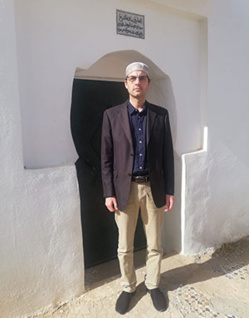
Abd-al-Wadoud Gouraud in front of the mausoleum of Sheikh ‘Abd al-Wahhab al-Tâzî, spiritual master and former rector of Al-Qarawiyyin University.
This charitable faith, this fear and this service of God, turned towards the search for eternal Wisdom, on the very model of the prophets, are found in the teachings and in the spiritual heritage of the many masters and “Friends of God” (awliya’ Allah) who are buried in the huge cemetery overlooking the medina of Fez, and whom we had the honor to greet during our visit.
Al-‘ârif bi-Llâhthe “knowing by God”, al-ghinâ li-Llâh, “wealth belongs to God” Where “God is the Independent Absolute”, cannot be reduced to simple epitaphs or pretty decorative calligraphy on tombs or mausoleums of saints belonging to a more or less distant past. It is the testimony of the intimate vocation of Man to the Knowledge of God, Reality one, unique and absolute; it is also a call to greater sincerity and higher aspiration on the path of spiritual poverty (FAQs), abandoning any self-will or individual pretensions of the ego. “If knowledge does not make your self disappear, ignorance is better than such knowledge”, says the Afghan Sufi master Sanâ’î. This word, quoted in the presentation document of the Festival program, takes on its full meaning here. The quality of the servant Prophet (‘abd) and illiterate (ummi), a sign of total transparency in the revelation of the Word of God, remains for the aspirant an essential model for realizing divine Knowledge.
Knowledge of the rich Sufi culture is inseparable from the implementation of “divine worship”
We have tried, during our interventions at the round tables, to testify to this global vision of Knowledge, based on the teachings of the masters of Islam and authentic Sufism, by recalling the metaphysical reality of tawhîd, the Oneness of God, at the origin of the creation of the visible and invisible worlds, guiding principle of all knowledge, spiritual or rational. This principle makes it possible to unify, without separating or confusing them, science and conscience, reason and faith, religion and holiness, and thus to avoid the dangers of concordism, which attempts to mix the revealed truths of the sacred texts with reasoning and scientific discoveries.
Masters like Abu Hamid al-Ghazali and Ibn ‘Arabi have shown the points of divergence and convergence between philosophy and spirituality in the Islamic tradition, indicating that, if the first is only an intellectual preparation for the divine gift of wisdom, the second must be considered as supra-rational, and not irrational.
What they call the alchemy of happiness corresponds to a process of inner transformation and purification of the soul which leads, through spiritual combat, to knowledge of oneself and of God, in accordance with the hadith: “He who knows himself knows his Lord. » It is important to emphasize, however, that this is a prophetic and initiatory method, which is based on doctrinal principles as well as precise rules and conditions. In this journey, it is indeed necessary to refer to the framework of exotericism and to a spiritual master, qualified and authorized, whose initiatory chain goes back to the Prophet, in order to be able to discern between the psychic and the spiritual, and not not to confuse ego emotions and knowledge of the heart.
To conclude this brief retrospective, more symbolic than factual, of a first contact with the Fez Festival of Sufi culture, it seems important to us to emphasize that knowledge of the rich Sufi culture is inseparable from the implementation of the “cult divine” which alone can transform us. This is how this spiritual, intellectual and artistic heritage of such inestimable value will not only be able to preserve its “spirit” and its authenticity, but also remain truly alive, in order to continue to enlighten people and nourish vocations, if God willing.
*****
Abd-al-Wadod Gouraud translator and specialist of Al-Ghazali, is a teacher at the Institute of Advanced Islamic Studies (IHEI). Abd-al-Haqq Guiderdoniastrophysicist, is director of the IHEI.
Read also:
A thousand years after the death of Al-Sulami, the legacy of the historian of Sufism and spiritual master in light
Forty hadiths on Sufism, a compendium of the teachings of the Prophet of Islam with Al-Sulami
We would like to thank the author of this write-up for this awesome material
Science, Consciousness and Presence: Meditation on Participation in the Fez Festival of Sufi Culture
You can view our social media pages here and additional related pages here.https://nimblespirit.com/related-pages/

